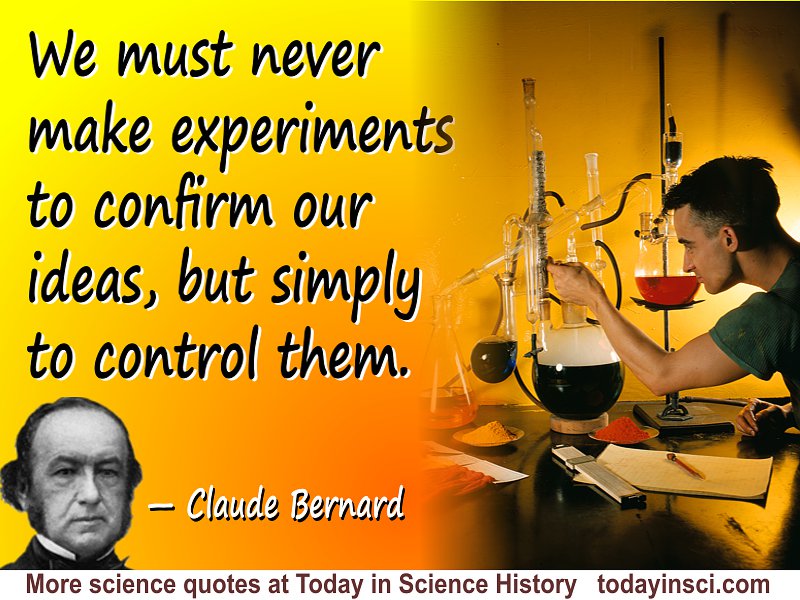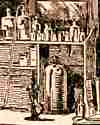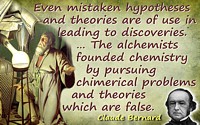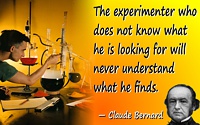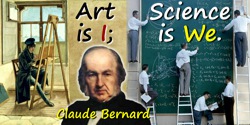Today in Science History - Quickie Quiz
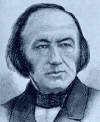 (source)
(source)
|
Claude Bernard
(12 Jul 1813 - 10 Feb 1878)
French physiologist who helped establish the principles of experimentation in the life sciences. His Introduction to the Study of Experimental Medicine (1865) is a scientific classic.
|
Claude Bernard - Make experiments to … control our ideas
Illustrated Quote - Large (800 x 600 px)
“We must never make experiments to confirm our ideas, but simply to control them.”
— Claude Bernard
From An Introduction to the Study of Experimental Medicine (1865, trans. 1957).
This quote by Claude Bernard appears in his native French in his book Introduction à l'étude de la médecine expérimentale (1865), as “Il ne fallait jamais faire des expériences pour confirmer ses idées, mais simplement pour les contrôler.” The version in English appeared in a translation by Henry Copley Green, An Introduction to the Study of Experimental Medicine (1957). In his original text, Bernard footnoted that he had previously expressed this idea in Leçons sur les propriétés et les altérations des liquides de l’organisme (1859), Première leçon.
In the translation, we can read a more complete quote:
“Men who have excessive faith in their theories or ideas are not only ill prepared for making discoveries; they also make very poor observations.
Of necessity, they observe with a preconceived idea, and when they devise an experiment, they can see, in its results, only a confirmation of their theory. In this way they distort observation and often neglect very important facts because they do not further their aim. This is what made us say elsewhere that
we must never make experiments to confirm our ideas, but simply to control them; which means, in other terms, that one must accept the results of experiments as they come, with all their unexpectedness and irregularity.”
Bernard continues: “But it happens further quite naturally that men who believe too firmly in their theories, do not believe enough in the theories of others.
So the dominant idea of these despisers of their fellows is to find others’ theories faulty and to try to contradict them. The difficulty, for science, is still the same. They make experiments only to destroy a theory, instead of to seek the truth. At the same time, they make poor observations, because they choose among the results of their experiments only what suits their object, neglecting whatever is unrelated to it, and carefully setting aside everything which might tend toward the idea they wish to combat. By these two opposite roads, men are thus led to the same result, that is, to falsify science and the facts.”
Sadly, these words written by Bernard 150 years ago still ring so true in our time. For example, consider how climate change deniers of today selectively cherry-pick data to support their preconceived intended outcome. Read Bernard’s words above with this modern example in mind, and you may better understand how he was writing about the struggles he knew for valid theories based carefully on facts to prevail against the deniers of his own time.
Text by Webmaster with quotes from
Introduction à l'étude de la médecine expérimentale (1865), 67-68. Translation from Henry Copley Green,
An Introduction to the Study of Experimental Medicine (1957), 38. Bernard footnoted that he had expressed this idea earlier in
Leçons sur les propriétés et les altérations des liquides de l’organisme (1859), Première leçon.
(source)See also:
- Science Quotes by Claude Bernard.
- 12 Jul - short biography, births, deaths and events on date of Bernard's birth.
-
Claude Bernard - context of quote The alchemists founded chemistry - Medium image (500 x 350 px)
-
Claude Bernard - context of quote “The alchemists founded chemistry” - Large image (800 x 600 px)
-
Claude Bernard - context of quote The experimenter - Medium image (500 x 350 px)
-
Claude Bernard - context of quote The experimenter - Large image (800 x 600 px)
-
Claude Bernard - context of quote Make experiments to … control our ideas - Medium image (500 x 350 px)
Nature bears long with those who wrong her. She is patient under abuse. But when abuse has gone too far, when the time of reckoning finally comes, she is equally slow to be appeased and to turn away her wrath. (1882) --
Nathaniel Egleston, who was writing then about deforestation, but speaks equally well about the danger of climate change today.
 Carl Sagan
Carl Sagan: In science it often happens that scientists say, 'You know that's a really good argument; my position is mistaken,' and then they would actually change their minds and you never hear that old view from them again. They really do it. It doesn't happen as often as it should, because scientists are human and change is sometimes painful. But it happens every day. I cannot recall the last time something like that happened in politics or religion. (1987) ...
(more by Sagan) Albert Einstein: I used to wonder how it comes about that the electron is negative. Negative-positive—these are perfectly symmetric in physics. There is no reason whatever to prefer one to the other. Then why is the electron negative? I thought about this for a long time and at last all I could think was “It won the fight!” ...
(more by Einstein) Richard Feynman: It is the facts that matter, not the proofs. Physics can progress without the proofs, but we can't go on without the facts ... if the facts are right, then the proofs are a matter of playing around with the algebra correctly. ...
(more by Feynman)
 (source)
(source)
